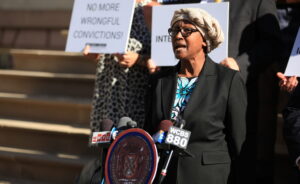
Dick Luger (R-IN) walked into the room from the Senate – he had the posture of a physician having to break a rough diagnosis to a family. He walked up to a young woman in tears and hugged her. “I’m sorry,” he said, explaining how the Senate he knew as a younger man would have passed the DREAM Act. Lugar was one of the last true moderate Republicans in the Senate, and would soon be defeated in a primary. His apology happened in 2010 just as the Tea Party was gaining enough momentum to throw a monkey wrench into the gears of legislation, beginning the GOP’s decade-long pull to the right. Organizing with Luger’s primary campaign against Richard Mourdock (whose opinions on rape and abortion would ultimately torpedo his campaign), it is obvious in retrospect that the perennial hot-button topic of immigration would be legislatively untouchable for some time to come.
Working within the echoes of the DREAM Act being successfully filibustered, Deferred Action for Childhood Arrivals (DACA) was announced. DACA covered only those who were younger than 31 at the time of the announcement; had entered the US at 16 or younger; have clean records; meet educational requirements that could be supplemented with military service… Basically, it’s for the people brought into the country as children who have lived their lives as hard-working, model citizens without citizenship that even the most hardened anti-immigration politician would have a difficult time campaigning against.
However, even the least offensive immigration reforms find people who are easily offended and looking for a chance to grandstand.
DACA: The DREAM Act’s Consolation Prize
DACA was announced by the Obama Administration in the run-up to the 2012 election. This policy came only after an aggressive lobbying campaign that included slogans like the “Deporter-in-Chief” nickname that made former President Obama fairly uncomfortable.
Although DACA makes a day-and-night difference in the lives of many, it is a half-measure – an exercise of executive power in a legislative vacuum where, if even the DREAM Act gets filibustered, nothing could be done.
Those who jump through the many hoops DACA requires to get a reprieve from potential deportation and working papers. This allows them to live and work in the US without the constant threat of ICE showing up at their front door to bring them back to a country whose language they may not speak and whose people they do not know.
Immigration and the Trump Administration in General
Practicing immigration law during the Trump Administration, particularly after his appointment of Jeff Sessions as Attorney General, was brutal – Sessions was adept at carrying out an anti-immigration policy agenda, closing application routes and arguments for my clients as they were applying or arguing for them. The discretion of USCIS (immigration agency) and EOIR (immigration courts) was increasingly encouraged (if not outright forced) to break against immigrants under the direction of Sessions. This resulted in increased difficulty throughout the immigration process, whether it was an application for a family-based visa, or making a final plea for asylum.
Although Trump had a falling out with Sessions over his recusing himself from the Russia investigation due to obvious conflicts of interest, much of the harm he did to the system remains.
While former President Trump was particularly harsh on immigration, i.e. his golden escalator “Mexicans are rapists” opening speech, he was also prone to having slips in rhetoric in general. This includes several times when he suggested that something should be done for dreamers, such as “We’re working on a plan for DACA.” However, he followed this up with quotes like “Americans are dreamers, too,” and attempted to rescind DACA.
DACA Lawsuits
Despite DACA being the least offensive measure to reform immigration possible, it has been a lightning rod for controversy.
When there was an attempt to expand DACA with similar prosecutorial discretion being offered to the parents of DACA recipients through Deferred Action for Parents of Americans (DAPA), this was challenged in the 5th Circuit by a group of Republican governors and halted through an injunction in Texas v. United States. This is in addition to several unsuccessful lawsuits, such as one filed by perennial blowhard Joe Arpaio, as well as another by several agents of Immigration and Customs Enforcement (ICE).
This case shot to the top of the docket for the Supreme Court. However, the Supremes were down a justice after the death of Justice Scalia, and deadlocked 4-4 as the Senate refused to confirm Obama’s choice for Supreme Court Justice, Merrick Garland. Though it is easy to speculate that DAPA would have passed had Garland not been blocked by Senator McConnell, ultimately, DAPA became stuck in the courts.
In another lawsuit led by Texas in 2018, the constitutionality of DACA was challenged. While this was working through the courts, the Trump Administration unsuccessfully attempted to rescind the policy.
In January 2021, President Biden issued an executive order reinstating DACA, but in July 2021, Judge Andrew Hanen, in Texas v. United States, declared DACA to be illegal and beyond the powers delegated to the executive branch. This went to the 5th Circuit Federal Court of Appeals.
In the latest turn, the 5th Circuit has found that the Biden Administration attempted to create a regulation to turn DACA into a USCIS rule, or agency law for the agency that governs immigration, without going through the proper notice and comment rulemaking. The Biden Administration made this regulation to circumvent another claim against DACA.
The appeals court has sent its ruling on the DACA program back to the Texas district court for a ruling consistent with their finding. This is part of a years-long fight with the federal courts of Texas that has resulted in a compromise for DACA: the 100,000 applications submitted after the cutoff from the courts are not being processed, nor are any other new applications being accepted, however, those with DACA can apply to have it renewed.
Thumbnail Credits: EPA-EFE/ALBA VIGARAY
Sources
The above is an opinion piece by Attorney Ryan Campbell.





